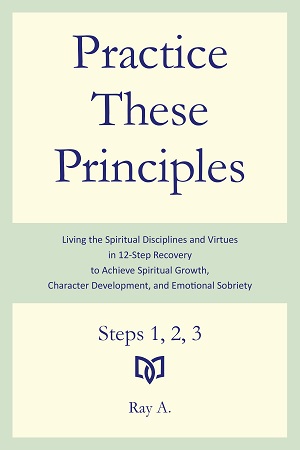
"The admission of powerlessness is a distinctly AA way of practicing certain spiritual principles that are key to recovery. Chief among these are the discipline of surrender and the virtue of humility. We have characterized these two principles as being foundational to the entire program, underlying all the Steps and extending through all stages of recovery. In Step 1, surrender and humility interact with four other virtues that help pave the way to the admission of powerlessness. These are the virtues of honesty, acceptance, willingness, and open-mindedness.
Of course, when we first “take” Step 1 and admit we are powerless to control our drinking or our lives, we can hardly be said to be practicing any disciplines or virtues. Discipline and virtue involve choice, and our very first surrender over alcohol is not exactly a product of choice. At the point of this surrender we are generally in a physical, emotional, and spiritual state that precludes the ability to choose. Indeed, it can be said that we surrender precisely because we have no choice. We have truly run out of options.
Few of us will surrender unless our backs are up against the wall. We do because we are in trouble, very serious trouble in many cases. We have made a mess of our lives and we can’t cope anymore. We have tried everything and nothing has worked. We have played our last card and we have lost. We are desperate and exhausted, and we have no fight left in us. Our willpower, in which we took so much pride, is useless. We can’t stop drinking and we can’t fix ourselves. Alcohol has beaten and humiliated us.
Defeat and humiliation drive us to the rooms and there we learn the true nature of our condition. For us alcoholics, willful in the extreme, defeat is a necessary condition for surrender, humiliation the way to humility. Our admission of powerlessness is forced on us by the consequences of what we have done as active alcoholics. We surrender only because we have been defeated in our attempt to live by our own power. Through “calamity and collapse,” we actually experience powerlessness. Admitting and accepting it is the next step. If we can scrape up enough honesty and humility to do so, it is because pain and suffering have rendered us “as open-minded to conviction and as willing to listen as the dying can be.”2
Admitting powerlessness is the first and fundamental step in surrender. This is so because the whole issue of power is central to the alcoholic problem, and to its solution. The acquisition and accumulation of power in all its forms is a natural part of our development as human beings. The problem arises when we disconnect from the source of that power, misuse that power, and reach for powers that are not ours to have. We try to center power on ourselves, on our own will, and we overreach. Power becomes self-serving and corrupting.
In this we alcoholics are no different from anyone else. But alcohol plays a peculiar role. “First I took a drink, then the drink took me,” we say in AA. At first, the bottle is a source of power. It fuels our imagination and our will. Under its influence, we think there is nothing we cannot achieve. And so we push, and often we push too hard and too far. With time, the bottle becomes a power unto itself. It controls us, and pushes us even further afar. It dissolves all natural restraints and silences our conscience. It brooks no limits. All is permissible. We cross lines we never even imagined we could possibly cross.
Warping our natural instincts and driving us to excess, alcohol eventually brings about our downfall. We sometimes say we drank to medicate our pain, but for many of us that came later. We first fell in love with the bottle for the sense of power it gave us. In the early stages this power was benign: we felt more sociable, less inhibited, less self-conscious. With time the power became destructive. We acted in ways that caused serious harm to ourselves and to others. We then medicated the resulting pain with more alcohol, which drove us to still more excess and more pain, and so on in an endless cycle of self-defeat. The bottle was in control, and we became powerless.
Lack of power is the alcoholic’s “dilemma.” We don’t have the power to break alcohol’s power over us. We need another Power. We are loath to admit to this. In our eyes, powerlessness is tantamount to helplessness. Paradoxically, the opposite is true. The alcoholic who cannot admit to her own powerlessness remains closed to the Power that can deliver her. Insisting on self-reliance when self-reliance is of no use, she will neither ask for nor accept help. She can’t help herself, nor can anyone help her. Clinging to the illusion of power and unable to admit her weakness, she remains in a state of total helplessness."
– From "Admitting Powerlessness," pp. 71–73
For more PTP123 Excerpts, please click on link.